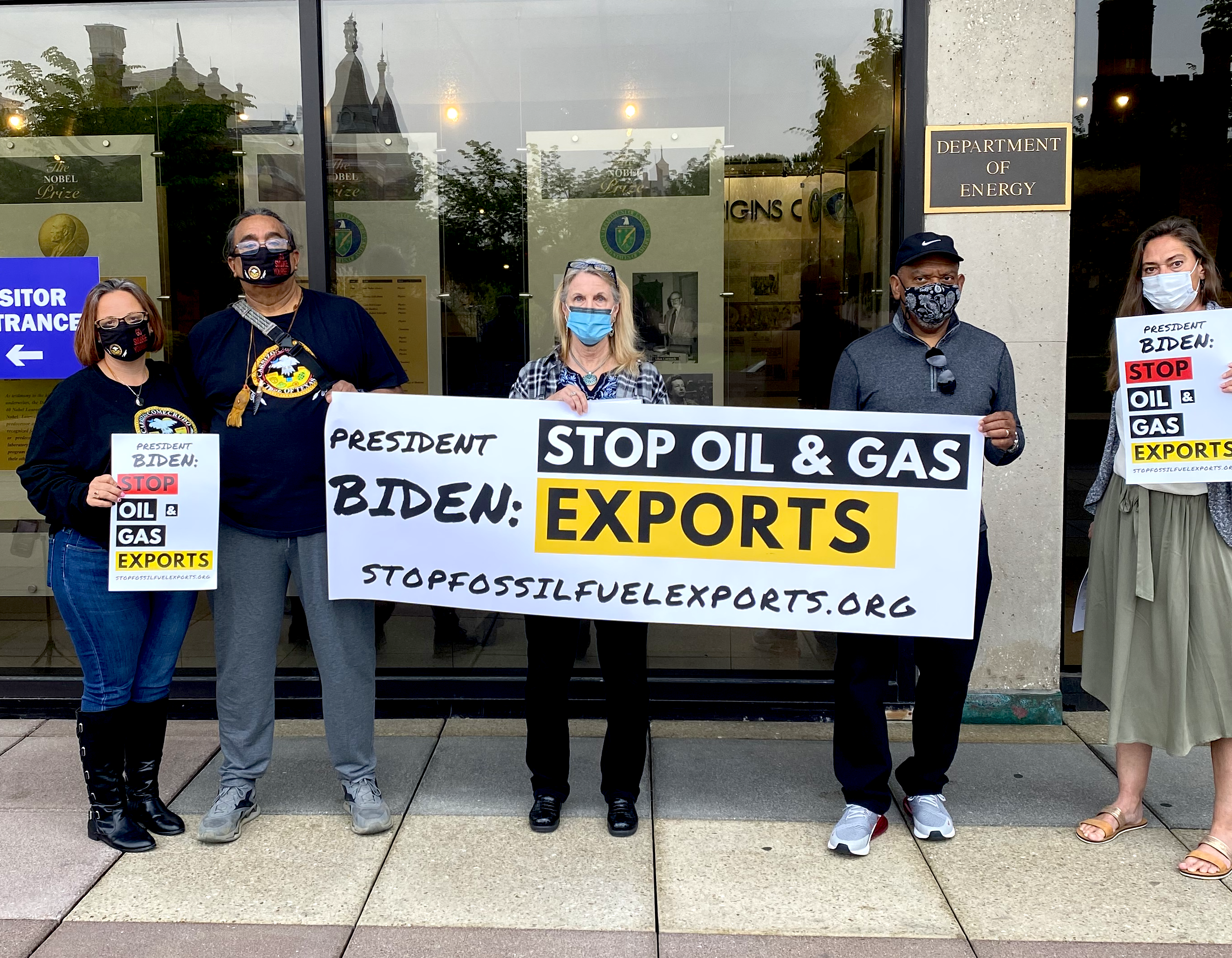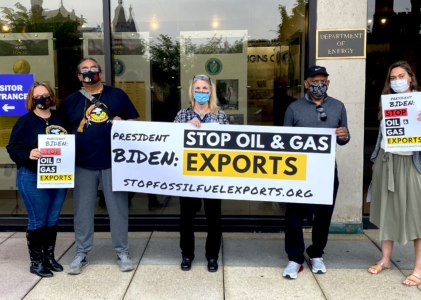Released by Earthworks / April 19 2021 / Original can be found here
—
Photos from letter delivery will be posted here
WASHINGTON— Gulf Coast community leaders kicked off a week of action in Washington, D.C. today with an event outside the Department of Energy calling on President Joe Biden to end fossil fuel exports.
The Gulf Coast residents delivered a letter signed by more than 230 climate, environmental justice, Indigenous, youth and community groups calling on President Biden to reinstate the ban on crude oil exports by declaring a climate emergency, stopping a substantial portion of gas exports and ending approvals for related fossil fuel infrastructure.
“There’s a dramatic disconnect between President Biden’s climate and environmental justice ambitions, and the reality of our oil and gas exports market run amok. To protect our communities and make good on his promises, Biden needs to end fossil fuel exports now,” said Melanie Oldham of Citizens for Clean Air and Clean Water in Freeport, Texas. Melanie was among the Gulf Coast community leaders who traveled to Washington, D.C. to deliver the letter.
The letter delivery and a website launch mark the start of a new Stop Fossil Fuel Exports campaign. The launch is part of the #DefendTheGulf Week of Action leading up to the Biden administration’s virtual climate summit with dozens of world leaders. The campaign seeks to amplify voices of communities most impacted by oil and gas exports, such as in Lavaca Bay, Texas, where fourth-generation shrimper Diane Wilson enters her 13th day of a hunger strike to protest an oil export dredging project in the Matagorda Ship Channel.
“I am risking my life to stop the reckless destruction of my community. Oil and gas export terminals like the project I am fighting pollute our air, water, and climate — only to pad the pockets of fossil fuel CEOs,” said Diane Wilson. “The Biden Administration needs to stop the dredging and stop oil and gas exports.”
Fossil fuel exports are booming, driven by a massive expansion of fracking and enabled by Congress’ reversal of the 40-year-old crude oil export ban in 2015. Senator Ed Markey (D-MA) has spearheaded legislation to reverse this decision, and expressed support for executive action to curb fossil fuel exports in the meantime.
“Fossil fuel extraction is a threat to our planet and its people, and the impacts fall greatest on our frontline communities. Reinstating the ban on crude oil exports is crucial to our climate goals and I applaud and join alongside the Gulf Coast community leaders and their partners in their efforts,” said Senator Ed Markey (D-MA). “I will continue to push for this reinstatement of the ban through legislation as we work to put environmental, racial, and economic justice first in the fight against the climate crisis.”
According to an analysis by Greenpeace USA and Oil Change International, fossil fuel exports have increased 750% since 2015, with nearly a quarter of all crude extracted in the United States bound for export as of 2019. Gas exports are on a similar trajectory.
“Fossil exports shifts the burden to those least able to transition, reduces domestic resources and increases our dependence, while further endangering coastal communities.” said John Beard, Founder and CEO of the Port Arthur Community Action Network. “We must stop the fossil fuel madness.”
The groups say that if the dozens of proposed oil and gas export projects under federal jurisdiction are built, Gulf Coast communities will face significant harms from added pollution, and then take a double hit when climate disasters strike.
Harms from both fronts fall disproportionately on Black, brown, Indigenous, and other communities of color, as well as low-wealth and other frontline communities.
“When Oil and Gas destroy the land to get at the resources, they go through our sacred village sites and burial sites,” said Juan Mancias, Chairman of the Carrizo-Comecrudo Tribe of Texas. “This genocide of our people and our culture continues today by allowing our spaces to be destroyed while others have protection.”
Melanie Oldham continued, “As a resident of the Texas Coastal community and a healthcare professional in a community facing two oil export projects, the Sea Port Oil Terminal and Texas GulfLink, I fear that the emissions of these two projects will put our largely Hispanic community back into ozone nonattainment, our air quality will decline, negatively affecting our children, elderly, and persons with respiratory illnesses. Fossil fuel export projects are not in the interest of the nation, not in the interest of Texas, and not in the interest of local communities. Why should our communities be asked to sacrifice our health and our beautiful Gulf Coast for the profit of the oil industry at a time when we must transition to renewable energy?”
President Biden can immediately halt the export of crude oil under executive legal authority granted to him by the 2016 Appropriations Act and the National Emergencies Act — as 350 groups formally petitioned President Barack Obama to do five years ago.
The president can also use his regular executive powers granted by bedrock environmental laws to stop fossil fuel export infrastructure approvals and a substantial portion of gas exports.
Swift executive action to end fossil fuel exports is a central premise of the progressive Climate President action plan and model executive order, which is supported by nearly 750 climate and environmental justice groups.
Ending oil and gas exports is also a core pillar of Build Back Fossil Free – a growing grassroots campaign pushing Biden to take executive action to end the era of fossil fuel production, declare a climate emergency and protect communities reeling from the climate and COVID-19 crises.
— END —

